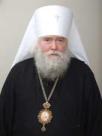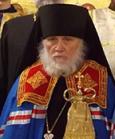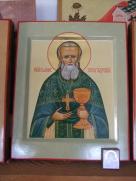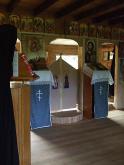Thursday, August 13, 2015
Abbess Alexandra: About two Church Issues (conference report). Part 2
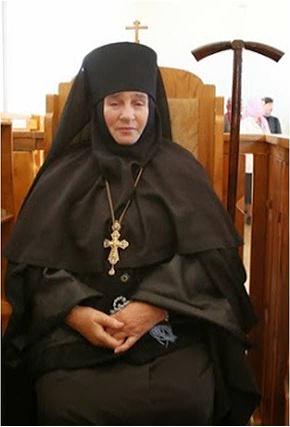 Part 2 of 2
Part 2 of 2
The second question concerns the proper concept of catholicity of the Church. I have met many worthy people among the first and second waves of Russian emigrants in America. However, in recent years there is a disturbing tendency present in our Russian Orthodox Church Abroad parishes. The parishioners think that the priest is simply a hired servant. They say: “We decide what to do - the priest is just supposed to serve”. Vladika Averky called this kind of parish “presbyterian”, because each parishioner is an “elder” [Tr. note: a presbyter] in spirit. A “presbyterian parish” holds the rights of the bishop, priest and layman equal. Accordingly, it believes that the parish can challenge the decisions of a Sobor or Synod. Unfortunately, this “presbyterian spirit” has gradually spread to all the parishes in America. During my last visit I had to avoid contact with my former close acquaintances, because it would be useless to argue. They are spreading presbyterianism to all areas of church life. All this stems from an incorrect understanding of the principle of conciliarity [Tr. note: sobornost] of the Church.
If we are Orthodox, we must abide by the decisions of the Council of Bishops and the Synod of our Church. It is not in our competence to challenge these decisions. If we do so, it means we are foolhardy enough to stand outside of the Church, outside of Orthodoxy.
Every bishop has his own character, his human qualities, and some shortcomings. It is possible for us to disagree a little with some of the bishops, perhaps even be disgruntled, but we should keep this to ourselves. We must not raise a rebellion within the Church due to personal ambitions. By doing so, we are destroying the Church, since, according to the canons, neither the laity, nor the priests steer the ship of the Church. This right is given to the bishops, who have received the grace of Christ through apostolic succession. The special cases in which it is necessary to express disagreement with the decisions of the Bishop (or Synod) are, as we know, defined by the canons.
Without the blessing of the Bishop, a priest has no right to serve. The bishop gives him an antimins, on which he can perform the service. In cases of necessity, the Bishop may confiscate the antimins. Then the priest can not serve; not to mention, to govern the Church. As much as all of us (priests, monastics and laity) would like to participate in solving church questions, we have no right to do so.
In Apostle Paul’s first letter to the Corinthians, by the Apostle Paul, we read:
“For as the body is one, and hath many members, and all the members of that one body, being many, are one body: So also is Christ.”
(1 Cor. 12:12).
In his sermons on this text, St. John Chrysostom writes:
For as the body and the head are one man, so he said that the Church and Christ are one. Wherefore also he placed Christ instead of the Church, giving that name to His body. “As then,” saith he, “our body is one thing though it be composed of many: so also in the Church we all are one thing. For though the Church be composed of many members, yet these many form one body.
[4]
Here I would like to offer a metaphor, and unfortunately I must resort to medical terminology. All the members of the Church are one body, and each member of the Church can be compared to an individual cell. It is obvious to anyone that a single call cannot control the organism. In the human body, in addition to the many useful cells, there is always a certain amount of unstable cells, which may form a tumour, which in turn can take over the entire body. Even if the tumor is removed, it can still happen that some of these cancer cells migrate through the lymphatic system and can cause a relapse destroying the body. Everyone knows that cancer cells need to be removed from the body for it to function normally.
Perhaps it is sinful and inappropriate to compare cancer cells with people who instigate rebellion within the Church. But in reality we unfortunately face a problem in the church when some priests assert that we have no conciliarity. In their opinion, conciliarity is disturbed by the fact that the ruling Bishop requires obedience of them. He demands that they be involved in their parishes, rather than travel about constantly from place to place as they want (to the Holy Land, Mount Athos, or other countries). They have spiritual children scattered around the world. However, in matters of spiritual guidance you need consistency, and a permanent, real-life contact with the flock, which is exactly what the ruling bishop requires of his priests. Otherwise the priests are playing at “being an elder”.
Among priests, there are also some who are engaged in politics. This is not at all a church-centred occupation. And if the bishop seeks to limit this kind of self-willed activity of priests in his diocese, they are ready to organise a rebellion in the Church. For these pastors conciliarity is the same as democracy. They would like to have a role in governing the Church. However, the canons establish that the Church is ruled by the bishops, the Synod and the Councils.
A proper understanding of catholicity of the Church is founded on the common effort of all the members of the Church (bishops, priesthood, monastics and laity) to preserve the Body of Christ in the spirit of love and harmony. Priests and lay people must communicate to the bishop (or if necessary even to the Synod) any problems or disputes, so that the Synod may make appropriate decisions. In no circumstances are the people of the church permitted to destroy the Body of Christ by divisive actions based on discontent.
On the question of conciliarity of the Church, I refer to the opinion of Metropolitan Filaret:
“Many misunderstand the concept of “catholicity”, and demand that lay people take part in the governance of the church, along with the bishops and clergy. In this regard, I would like to tell you briefly what is a true Sobor (Council).
In the book of Acts of the Apostles we read that there was a very serious discussion on whether to accept the pagans to Christianity directly. In other words, should they be baptised at once, or should they first be required to fulfill the law of Moses? When talking about this, the issue became so serious that even the apostles would not solve it themselves. They therefore came together to discuss it. In the book of Acts of the Apostles it says that “the apostles and elders came together for the consideration of this matter” (Acts 15:6). Now, naturally, you might ask: The apostles and presbyters, but what about the bishops? In fact, at the time when the Apostles served, their subordinates - bishops and priests - did not in essence differ much as to their powers and duties. However, when the apostles went to their Master in the better world, their place was taken by the bishops. That is the point at which the degree of bishops was separated from the priesthood, as being superior. But at the time of the Apostles, both the bishops and priests were subordinates, the assistants of the Apostles. We see that it is so, for example, from the place in the book of the Acts of the Apostles, which reads: “For Paul …. sent to Ephesus, and called the elders of the church.” (Acts 20:17) A little further on in the text, he says that the Apostle addressed them and said: “Take heed therefore unto yourselves, and to all the flock, over the which the Holy Ghost hath made you overseers, to feed the church of God, which he hath purchased with his own blood.” (Acts 20:28) So, the very same people are referred to as both “bishops” [overseers] and “elders” [presbyters] in the Book of Acts.
Gathering in Council, the Apostles also called their subordinates to the discussion of this important issue. That is how the question was discussed. When the Council ended, the decision statement began: [b]“The apostles and elders and brethren send greeting unto the brethren…”[/b] (Acts15:23). The brethren - that is, of course, the laity. It is clearly indicated that the discussion of the matter and decisions were made only by the Apostles and their subordinates - the members of the clergy. The lay people were probably present, but did not have a voice in this context. Possibly they took part in the statements of their views. Nevertheless, they did not have what is called a “decisive” voice. The resolution of the Council was still sent on behalf of all the brethren.
The Apostolic Council was the prototype of the Ecumenical Councils. Since there were no more Apostles, the Councils were headed by bishops. Members of the clergy were also present, and at some of the Ecumenical Councils there were even laymen. It is quite different with the Councils of Bishops, which meet not as rarely as Ecumenical Councils, and which do not make decisions on extraordinary questions, but rather gather regularly and continuously. The basic rule regarding the Council of Bishops states: The Council of Bishops should meet twice yearly, in order to discuss with each other any difficulties of questions encountered. There is not even a hint about laymen. On the contrary, the rule emphasizes that the bishops should only confer “with each other.” This is the way it always has been at Councils of Bishops.”
“Scripture says,” Every man a liar “, or in plain speech [Russian]: every man is a liar. This does not mean that we are all lying all the time - no! This means that no one person, no matter how wise, or holy if you like, or experienced, etc, can claim infallibility and rely on his own opinions. The higher the issues and questions, the more dangerous the mistakes. In matters of religion, the church, and moral teaching, no one can rely solely on himself. The Church has left us canons, laws and regulations as the basis upon which normal church life is built. No matter what ugliness in life will make its appearance, and no matter what difficulties we will have to face, we must keep this framework inviolate! This is why a bishop of the Orthodox Church proclaims his confession of faith, his episcopal promise, immediately before his consecration. It is a statement that he personally commits to being the custodian of all the conciliar rules and canons of the Holy Apostolic Church. He promises to be a guardian of them, even at threat of death.”
“The canons and rules of the Church are the spiritual foundation upon which spiritual life rests. No one can abandon this foundation without immediately running into mistakes and errors. Once St. Seraphim of Sarov said to one of the Old Believers, who came to him and tried to develop his thoughts (the Elder, as always, told him with love, but at the same time powerfully and strictly): “Leave your nonsense! The ship of Christ’s Church is sailing on the waves of the sea of life, and they cast Her about. She makes the voyage with great difficulty, yet you want to sail the ocean in the little boat of your own wise thoughts - this is madness!”. [5]
Abbess Alexandra
[4] St. John Chrysostom. Collected Works. Homily XXX on Corinthians.
[5] St. Filaret Voznesensky. Sermon “Catholicity and sobornost.”
